How to get your baby started on solids
It can be all new territory & often overwhelming for a new mom to know when & how to introduce solids to a baby. On top of all the “newness,” there is so much conflicting evidence on what foods & what feeding methods are best.
Here’s the punch line – there is NO ONE RIGHT WAY TO FEED YOUR BABY!! Let that sink in for a minute….. hopefully you can feel some weight lift off your chest.
That’s my goal – to give you the confidence as a mom to know what’s right for you & your baby!

If you want to get a crash course in starting solids & quickly become confident nourishing your little one – my E-course “The Ultimate Guide To Starting Solids” is a must have!!!
Knowing When To Introduce Solids.
Your baby might be ready for solids when he/she is…
- Between 4-6 months of age (the American Academy of Pediatrics & other experts recommends babies be exclusively breastfed until 6 months).
- Can sit without support
- Reaches for objects & brings to mouth – showing interest in food
- Has lost the tongue reflux & does not instantly push food out of the mouth
Ways To Feed Your Baby
Traditionally, iron-fortified rice or oat baby cereal are introduced first, followed by single food purees (pea, carrot, banana etc.). However, a newer feeding approach, known as baby-led weaning (BLW) has been gaining popularity. BLW skips the purees and mashed foods and jumps right to finger foods. The premise is that your little one has control over his/her food intake from the start. When using BLW, baby will mostly eat foods that are soft, easy to grab, and cut into long, thin strips. Foods include avocado slices, steamed vegetable pieces, soft pasta noodles, sliced eggs and more.
Is one feeding style better than the other?
No, there are pros and cons to each style. Breastmilk and/or formula will be baby’s #1 source of energy and nutrition during the first year of life, but nutrition from food still matters during this time period. Starting around 6 months of age, introducing baby to a variety of foods, textures, & nutrition can help set the stage for an overall healthy relationship with food.
The benefit of pureed foods include convenience for parents, less mess overall, and baby is likely to consume more of the food offered, and in turn, more nutrition!
While the research is still emerging, some experts believe there are benefits to BLW. Including baby’s development of self-feeding, early learning of hunger and fullness cues, and enhanced development of fine motor and oral skills.
What Foods To Start With.
There is no medical evidence that introducing solid foods in any particular order has an advantage for your baby (e.g. fruit vs. veggies first).
That said, the emphasis should be on iron-rich foods , especially in breastfed infants, since breastmilk is not a good source of iron for baby. Between 4-6 months of age, baby’s iron stores begin to deplete, which is why foods rich in iron, such a fortified baby cereal, or soft meats are a good choice to start with. You may also consider an iron supplement. Be sure to check with your baby’s doctor.
As your baby advances, exposure to a variety of different foods, textures, and forms are important for developing baby’s taste palate, food preferences and ensuring intake of a variety of key nutrients! Make sure to grab my FREE downloadable guide with the top 7 foods to feed your little one in the first year of life.
Foods to Avoid
Emerging evidence suggests there is not need to only introduce one food at a time. On the other hand, some experts recommend waiting 2-3 days between introducing new foods to your baby, especially the most common allergenic foods (eggs, wheat, soy, peanuts, tree nuts, dairy, shellfish, fish etc). This will allow parents to monitor if and what foods baby may react to. At this time, I’d say the choice if up to you, and I’d recommend a conversation with your baby’s healthcare team.
There are certain foods that should be avoided during infancy due to their high-risk of choking. Foods such as leafy greens, whole nuts, popcorn, honey, thick nut butters and more can be a choking hazard.
Always monitor your baby during any feeding session for signs of choking and/or allergic reactions. You can learn more about choking here.
What About Allergens?
The topic of food allergies is an important one for parents, and one often either forgotten about, or worried about.
The latest position from the American Academy of Pediatrics suggests “there is no evidence that waiting to introduce baby-safe (soft), allergy-causing foods, such as eggs, dairy, soy, peanuts, or fish, beyond 4 to 6 months of age prevents food allergy.”
In fact, many experts encourage parents to introduce allergenic foods to babies early & often. That said, there are considerations when introducing your baby to allergenic foods. Some experts suggest introducing one potentially allergenic foods to your baby at a time, and wait 2-3 days before trying a new food. This will help you identify if (and what food) your baby might be allergic too.
If you believe your baby has an allergic reaction to a food, such as diarrhea, rash, or vomiting, swelling, or difficulty breathing, talk with your child’s doctor about the best choices for your baby’s diet. Of course, in case of an emergency, call 911.
I go more in-depth on this topic in mini E-course “The Ultimate Guide To Starting Solids.” As always, I recommend consulting with your healthcare team before introducing solids and potentially allergenic foods, especially if a family risk of food allergies.
Favorite Feeding Products!
This wouldn’t be a complete post if I didn’t share a few of my favorite feeding tools & products (I share a full list in my E-course!)
References:
https://www.healthychildren.org/English/ages-stages/baby/feeding-nutrition/Pages/Starting-Solid-Foods.aspx
https://www.aappublications.org/news/2019/03/18/atopy031819
https://www.cdc.gov/nutrition/infantandtoddlernutrition/foods-and-drinks/when-to-introduce-solid-foods.html
https://www.healthychildren.org/English/tips-tools/ask-the-pediatrician/Pages/When-can-I-start-giving-my-baby-peanut-butter.aspx
*This post contains links to Amazon.com. As an Amazon Associate I earn from qualifying purchases.

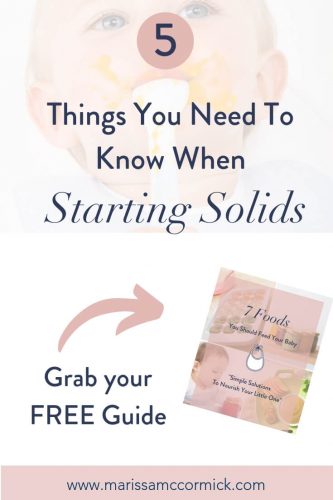
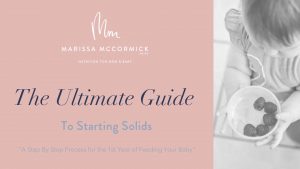
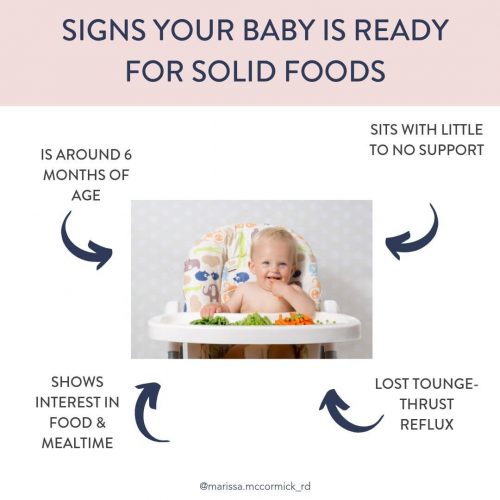
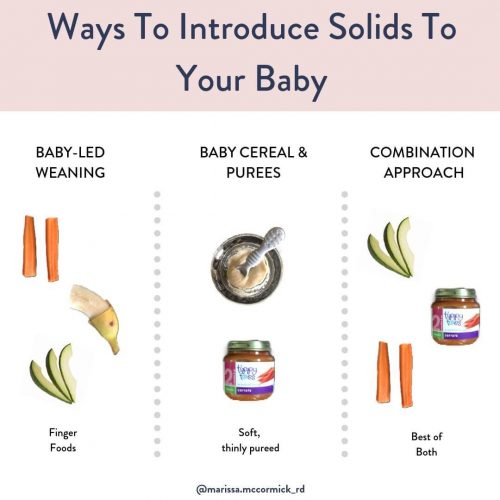
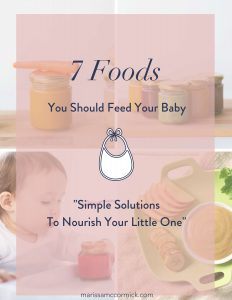
Be the first to comment